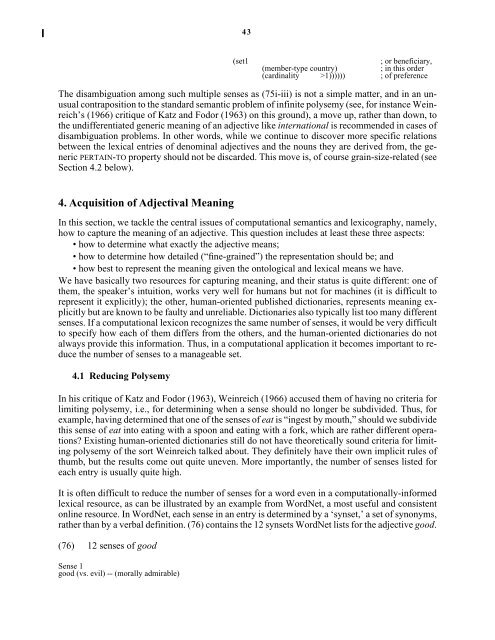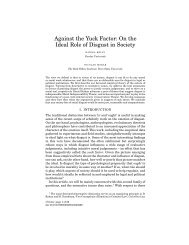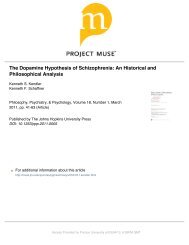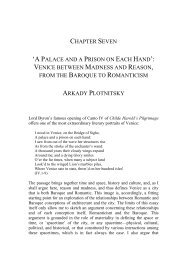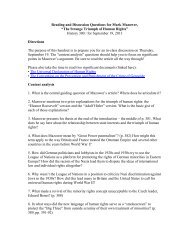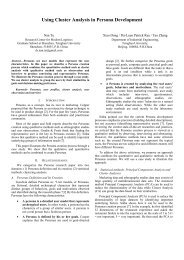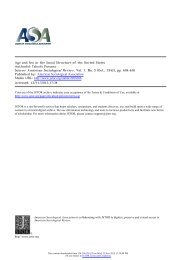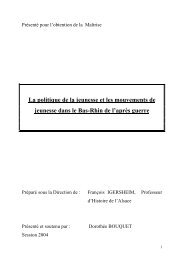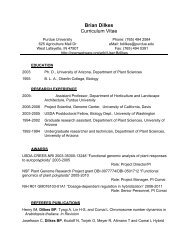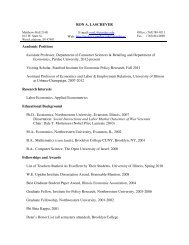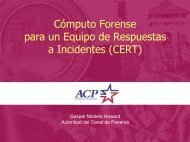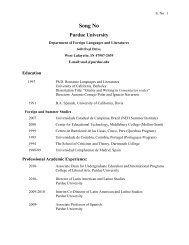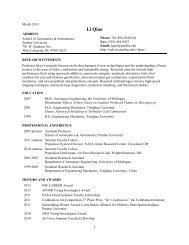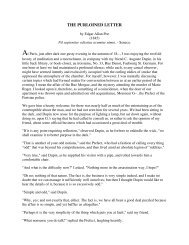Lexical Semantics of Adjectives - CiteSeerX
Lexical Semantics of Adjectives - CiteSeerX
Lexical Semantics of Adjectives - CiteSeerX
You also want an ePaper? Increase the reach of your titles
YUMPU automatically turns print PDFs into web optimized ePapers that Google loves.
43<br />
(set1 ; or beneficiary,<br />
(member-type country) ; in this order<br />
(cardinality >1)))))) ; <strong>of</strong> preference<br />
The disambiguation among such multiple senses as (75i-iii) is not a simple matter, and in an unusual<br />
contraposition to the standard semantic problem <strong>of</strong> infinite polysemy (see, for instance Weinreich’s<br />
(1966) critique <strong>of</strong> Katz and Fodor (1963) on this ground), a move up, rather than down, to<br />
the undifferentiated generic meaning <strong>of</strong> an adjective like international is recommended in cases <strong>of</strong><br />
disambiguation problems. In other words, while we continue to discover more specific relations<br />
between the lexical entries <strong>of</strong> denominal adjectives and the nouns they are derived from, the generic<br />
PERTAIN-TO property should not be discarded. This move is, <strong>of</strong> course grain-size-related (see<br />
Section 4.2 below).<br />
4. Acquisition <strong>of</strong> Adjectival Meaning<br />
In this section, we tackle the central issues <strong>of</strong> computational semantics and lexicography, namely,<br />
how to capture the meaning <strong>of</strong> an adjective. This question includes at least these three aspects:<br />
• how to determine what exactly the adjective means;<br />
• how to determine how detailed (“fine-grained”) the representation should be; and<br />
• how best to represent the meaning given the ontological and lexical means we have.<br />
We have basically two resources for capturing meaning, and their status is quite different: one <strong>of</strong><br />
them, the speaker’s intuition, works very well for humans but not for machines (it is difficult to<br />
represent it explicitly); the other, human-oriented published dictionaries, represents meaning explicitly<br />
but are known to be faulty and unreliable. Dictionaries also typically list too many different<br />
senses. If a computational lexicon recognizes the same number <strong>of</strong> senses, it would be very difficult<br />
to specify how each <strong>of</strong> them differs from the others, and the human-oriented dictionaries do not<br />
always provide this information. Thus, in a computational application it becomes important to reduce<br />
the number <strong>of</strong> senses to a manageable set.<br />
4.1 Reducing Polysemy<br />
In his critique <strong>of</strong> Katz and Fodor (1963), Weinreich (1966) accused them <strong>of</strong> having no criteria for<br />
limiting polysemy, i.e., for determining when a sense should no longer be subdivided. Thus, for<br />
example, having determined that one <strong>of</strong> the senses <strong>of</strong> eat is “ingest by mouth,” should we subdivide<br />
this sense <strong>of</strong> eat into eating with a spoon and eating with a fork, which are rather different operations?<br />
Existing human-oriented dictionaries still do not have theoretically sound criteria for limiting<br />
polysemy <strong>of</strong> the sort Weinreich talked about. They definitely have their own implicit rules <strong>of</strong><br />
thumb, but the results come out quite uneven. More importantly, the number <strong>of</strong> senses listed for<br />
each entry is usually quite high.<br />
It is <strong>of</strong>ten difficult to reduce the number <strong>of</strong> senses for a word even in a computationally-informed<br />
lexical resource, as can be illustrated by an example from WordNet, a most useful and consistent<br />
online resource. In WordNet, each sense in an entry is determined by a ‘synset,’ a set <strong>of</strong> synonyms,<br />
rather than by a verbal definition. (76) contains the 12 synsets WordNet lists for the adjective good.<br />
(76) 12 senses <strong>of</strong> good<br />
Sense 1<br />
good (vs. evil) -- (morally admirable)


